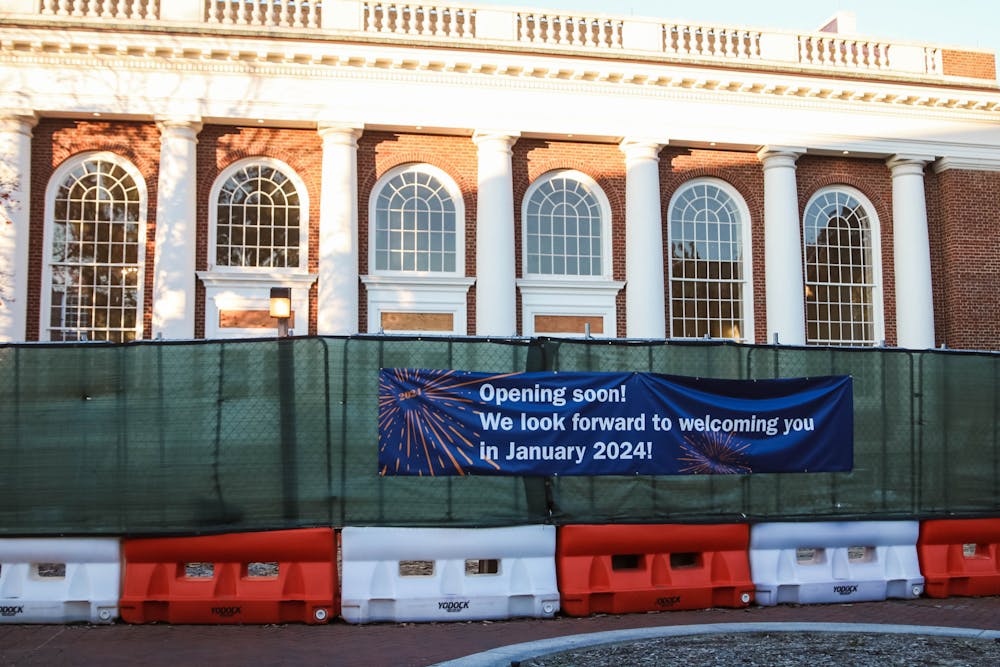The University’s main library — which has been closed for renovations since 2020 — may reopen next semester under a new name. Following years of critiques over Alderman Library’s namesake, an internal library research naming group submitted a report to the University’s Naming and Memorials Committee requesting a name change for Alderman Library before it opens to students Jan. 2.
Edwin Alderman was the first president of the University from 1905 until 1931. Although Alderman valued democratizing higher education, he was also a proponent of eugenics — a pseudoscience that aims to “improve” the genetics of the human population by controlling who can have children. Eugenics gained popularity in American culture during the first half of the 20th century and historically has been used to justify discrimination and prejudice against racial minorities, especially Black populations.
According to Elyse Girard, executive director of communications and user experience for University libraries, U.Va. Libraries started an internal library research naming group December 2019 to consider the Alderman name.
“Because of the things that happened under [Alderman’s] leadership, we felt like it might be a good time to reconsider,” Girard said. “With the renovation and the library being so different from what it was before, a new name might be the best thing to go with it.”
After pandemic-related delays and the library’s closure to renovations March 2020, John Unsworth, University librarian and dean of libraries, submitted a formal request for consideration of an Alderman name change to the Naming and Memorials Committee in June 2021. The group is composed of faculty and Board of Visitors members appointed by University President Jim Ryan to study the contextualization of statues and buildings on Grounds.
That request sits with the Board of Visitors as of May 2023 and awaits consideration by its Buildings and Grounds Committee. Despite receiving the recommendation before their September meetings, the Board has yet to take the recommendation up on one of their agendas. Within the language of the request, the research naming group could not suggest any potential new names for the building, but just recommend that it have a different name. Ultimate discretion will be left to the Board.
If the Board does not make a decision before the library’s opening, it will open as Alderman Main Library, Girard said.
Lillian Rojas, student member of the Board and fourth-year Batten student, said that she received lots of feedback from students looking to change the library’s name in a Microsoft Form asking for general student feedback about the University that she sent out to the student body in September.
“[Students] knew Alderman’s history and a lot of initiatives that he supported, especially revolving around eugenics,” Rojas said. “[Students said] ‘it’s 2023, there's no reason to have a building named after him.’”
Rojas said she’s currently in conversation with Rector Robert Hardie about considering the Naming and Memorials Committee’s recommendation. While she is unsure of the process of setting the docket for Board meetings because it is not within her responsibilities, Rojas said she will continue to have conversations with Hardie and plans to send him a compiled list of student responses about the topic. According to Rojas, Hardie seemed open to hearing what students have to say.
Ryan addressed the possibility of the library’s renaming back in Sept. 2019, before the formal consideration request was submitted. He told The Cavalier Daily that administration was considering renaming various buildings on Grounds with controversial namesakes, but no concrete decisions had been made at the time.
The movement to change Alderman Library’s name exists in the midst of other name changes around Grounds in attempts to grapple with the University’s complex history. The Board, for example, approved renaming Maury Hall to John W. Warner Hall in March 2022. This building, which serves at the Naval ROTC center on Grounds, originally took its name from Matthew Fontaine Maury — a Confederate naval officer and oceanographer who had no affiliation to the University and was an adamant supporter of slavery. The new name honors the legacy of John W. Warner, a U.Va. Law school graduate who served as a Secretary of the Navy and a Virginia senator.
The Board also supported name changes for the School of Education and Human Development, which was originally called the Curry School of Education after J. L. M. Curry, an educational reformer in the 19th century, a Confederate officer and strong segregationist.
The Board approved changing the name of the School of Education’s’ main building from Ruffner Hall to Ridley Hall. The new name reflects the legacy of Walter Ridley — the first Black student at the University to earn an educational doctorate degree in 1953. William H. Ruffner, the building’s original namesake, was the first superintendent of Virginia public schools who owned slaves and supported a movement calling for the relocation of all freed enslaved people to Africa.
Other moves to redirect the University away from honoring racist individuals include removing an inscription to Confederate soldier Frank Hume from the Whispering Wall next to Newcomb Hall. This movement was majorly spurred by student advocacy over the course of years.
To Girard’s knowledge, the library is the only place on Grounds with Alderman’s name currently requesting a name change. Other areas, such as Alderman Road, will keep their names.
As of now, Girard and other library administrators remain in the dark about the name change’s status as the library reopening date approaches.
“It's our sincere hope that they take it up in December,” Girard said. “Our doors will open to students, Jan. 2, 2024 and we'll have a formal grand opening April 4 of 2024. We would love to open the doors with knowledge of what the actual name of the library will be.”







